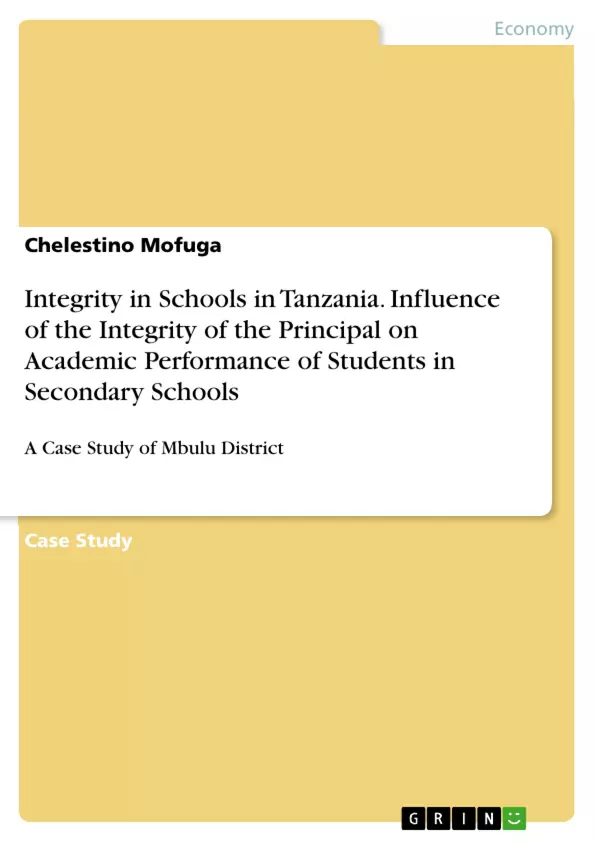This study assesses the influence of the integrity of school leaders on the academic performance of students in secondary schools. A explanatory cross-sectional survey design with a concurrent mixed approach, using quantitative and qualitative data, was employed.
A total of 202 teachers provided evidence on their head of school's integrity in influencing students’ academic performance. The study used questionnaires, in-depth interview and focus group discussion to collect the data. Afterwards the collected data was analysed using SPSS version 23 for quantitative data, and thematic analysis for qualitative data. A significant relationship between the integrity and students’ academic performance was revealed. The study concluded that the integrity attribute significantly influenced the students’ academic performance.
Therefore, the study recommends the government to allocate enough funds for professional development for future aspirants. Secondly, it recommends to review educational policy on the training and development of teachers before and after their appointment into a leadership position.
Inhaltsverzeichnis (Table of Contents)
- INTRODUCTION
- OBJECTIVES OF THE STUDY
- Main objective.
- Specific objectives.
- METHODOLOGY
- FINDINGS AND DISCUSSION
- CONCLUSION
- TABLES AND FIGURES
- DISCLOSURE OF CONFLICT OF INTEREST.
- ACKNOWLEDGEMENT.
- The relationship between integrity and student academic performance in secondary schools.
- The impact of leadership integrity on the effectiveness of educational institutions.
- The significance of leadership attributes, such as accountability, transparency, and access to information, in promoting student success.
- The role of integrity in enhancing stakeholder confidence and reducing conflict within secondary schools.
- The importance of professional development programs for aspiring and current school leaders to foster integrity and ethical practices.
- INTRODUCTION: This chapter introduces the concept of integrity in education and its paramount importance for the success of educational institutions, particularly secondary schools. It highlights the key attributes of integrity, such as honesty, ethical conduct, and trustworthiness, and their influence on student academic performance. The chapter also discusses the mixed-methods approach employed in the study, including the use of questionnaires, interviews, and focus group discussions.
- OBJECTIVES OF THE STUDY: This chapter outlines the main objective and specific objectives of the study. The main objective is to assess the influence of the integrity attribute of school leaders on student academic performance. The specific objectives delve deeper into examining the relationship between integrity and student performance, exploring the impact of various integrity attributes on school effectiveness, and investigating the role of professional development programs in fostering integrity among school leaders.
- METHODOLOGY: This chapter describes the research methodology used in the study, including the study design, data collection methods, sampling procedures, and data analysis techniques. It provides a comprehensive overview of the research process, outlining the steps taken to gather and analyze data related to the influence of leadership integrity on student academic performance.
Zielsetzung und Themenschwerpunkte (Objectives and Key Themes)
This study investigates the influence of the integrity attribute of school leaders on student academic performance in secondary schools in Tanzania. Using a mixed-methods approach with quantitative and qualitative data collection, the research explores the connection between leadership integrity and student achievement in the Mbulu District.
Zusammenfassung der Kapitel (Chapter Summaries)
Schlüsselwörter (Keywords)
The primary focus of this study is on the impact of leadership integrity on student academic performance in secondary schools. Key terms and concepts include integrity, leadership, academic performance, accountability, transparency, access to information, stakeholder confidence, conflict reduction, professional development, and educational policy.
Frequently Asked Questions
Does the integrity of a school principal affect student grades?
Yes, the study conducted in Tanzania revealed a significant relationship between the integrity of school leaders and the academic performance of students in secondary schools.
What are the key attributes of integrity in school leadership?
Key attributes include honesty, ethical conduct, trustworthiness, accountability, and transparency in decision-making processes.
How does transparency help in a school environment?
Transparency enhances stakeholder confidence (parents, teachers, students) and helps reduce internal conflicts, creating a better environment for learning.
What are the recommendations for the Tanzanian government?
The study recommends allocating funds for professional development and reviewing educational policies regarding the training of teachers before they take on leadership roles.
What research method was used in this study?
The study used a concurrent mixed-methods approach, combining quantitative data (questionnaires from 202 teachers) and qualitative data (interviews and focus groups).
- Quote paper
- Chelestino Mofuga (Author), 2020, Integrity in Schools in Tanzania. Influence of the Integrity of the Principal on Academic Performance of Students in Secondary Schools, Munich, GRIN Verlag, https://www.grin.com/document/924980



